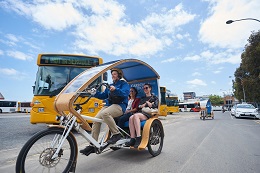16 November 2017
 Adelaide’s obsession with private transport could be given a major shakeup in the coming decade with a proliferation of share bike and car schemes, eco-caddies and Uber services.
Adelaide’s obsession with private transport could be given a major shakeup in the coming decade with a proliferation of share bike and car schemes, eco-caddies and Uber services.
The global shift to a shared transport economy is already transforming European and North American cities and University of South Australia researchers have now been tasked with investigating the potential impact for Adelaide’s CBD.
UniSA will use a $300,000 grant from the CRC for Low Carbon Living to partner with the SA Government and Adelaide City Council to map the role that shared economy mobility services can play in reducing inner-urban transport systems.
If Adelaide follows the same trend as Europe, carbon emissions will be reduced significantly in the city, along with traffic congestion and relieving pressure on providing car parking places, says project leader Dr Stephen Berry.
Dr Berry, a researcher in UniSA’s Barbara Hardy Institute, says younger people and tech-savvy baby boomers are behind the shift in transport use.
“Generations of transport users are growing up within the paradigm of the sharing economy. Many residents, workers, students and tourists are now seeking access to a broader range of transport options, partly due to cost, partly due to convenience, but also because they are fun ways to get around,” Dr Berry says.
Research indicates that economic and environmental sustainability is a key motivator for people to join commercial share schemes but little is known about the obstacles to achieving this.
“One of the key challenges is that – due to its diversity and rapid evolution – it may be difficult to regulate shared transport schemes.
“From a carbon neutral perspective, we also want to find out how the shared transport economy will influence people to adopt human-powered, electric and other low carbon technologies.”
While Adelaide is offering more shared transport options in the CBD – such as the bike-sharing schemes Ofo, potentially oBike, and EcoCaddy – adoption levels are currently low.
“We will be looking at who is currently using these schemes and what the triggers and barriers are to people either supporting them or rejecting them,” Dr Berry says.
Sustainable marketing expert Dr Anne Sharp from UniSA’s Ehrenberg-Bass Institute predicts that shared transport options will become the norm in future.
“They will be used across the board, not just by a few sustainability-minded people. This is what we have seen happen in other markets,” Dr Sharp says.
“An interesting question is to see how share cars challenge the notion of car ownership which has been our behaviour since their invention. Moving into a rent-by-the-hour transaction is truly reshaping how we think about cars and how they fit into our lives.”
EcoCaddy founder Daniels Langeberg, who launched his pedicab business in Adelaide in February 2015, has just clocked up an impressive 40,000 trips, reflecting the strong consumer demand for environmentally-friendly transport options.
“In that time I estimate we have reduced 7.4 tonnes of carbon emissions, with 80 per cent of our customer base local residents and the remaining 20 per cent visitors,” Langeberg says.
Media contact: Candy Gibson mobile 0434 605 142 email mailto:candy.gibson@unisa.edu.au




